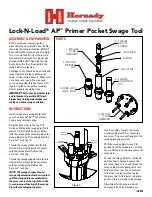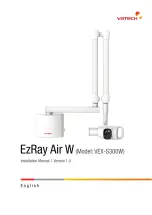
15HMC0066 | 05/2015
Hornady Manufacturing Co. • P.O. Box 1848, Grand Island, Nebraska 68802-1848
308-382-1390 • 800-338-3220 • Fax: 308-382-5761 • Hornady.com/contact
680036
Insufficient swage may make primer
seating difficult and over-swaging could
damage the swage plate support stem or
the cartridge case.
NOTE:
The Lock-N-Load Primer Pocket
Swage is designed to swage the crimp
and not the entire primer pocket.
Continue this process, making
adjustments in 1/8 turn increments until
desired swage is achieved. The swage
punch assembly will eject the case from
the swage punch. If desired, you can use
a small amount of case lube on the swage
punch or on the primer pocket.
A properly swaged primer pocket will
have a small radius at the edge of the
primer pocket
(see photo below)
. It is
wise to set the swage for a minimal radius
and test by seating a primer in the case.
Adjust until enough swage is achieved to
seat a primer properly.
NOTE: If using lube, remove it before
priming as many lubes will contaminate
primers.
Once proper swage is achieved, thread
the swage adjust lock ring (9) down onto
the o-ring (8) to lock the swage adjust
screw position.
At this point, the press is set and ready
to swage the pockets. Start the process
by cycling the press and inserting
sorted, de-primed cases into the swage
alignment die
(station 4)
at the top of the
stroke. When the first case reaches the
swage die
(station 1)
, it will be swaged.
You will feel the cam-over of the press as
it’s swaging. Continue cycling the press.
When the first case reaches the stripper
die
(station 3)
, it will be lifted from the
swage plate support anvil. When the
second case reaches the stripper die, it
will push the first case out the top of the
die allowing removal
(Fig. B)
.
INSTRUCTIONS (CON’T)
Figure B
Insert
Remove
A properly swaged primer pocket.




















